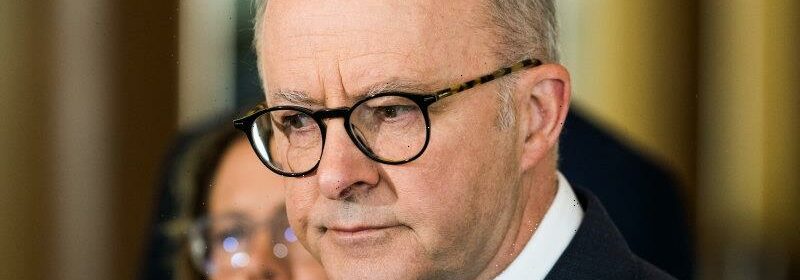Albanese hopeful on interest rate, inflation front

Prime Minister Anthony Albanese is hopeful inflation has peaked and will take pressure off the Reserve Bank to inflict severe interest pain on the nation’s home buyers as his government stands by its commitment to the $254 billion stage three personal tax cuts.
Albanese on Thursday said an ebbing in inflationary pressures through this year meant the RBA, which is expected to lift interest rates by another quarter of a percentage point at its meeting next week, was unlikely to drive up rates as much this year as it did through 2022.
Prime Minister Anthony Albanese says with inflation likely to have peaked, interest rates are not expected to climb as much as they did through 2022.Credit:James Brickwood
Inflation to the December quarter reached a 30-year high of 7.8 per cent but Treasury and the Reserve Bank are forecasting the rate to ease over the coming months.
The Reserve has lifted interest rates at its last eight consecutive meetings, taking the cash rate from 0.1 per cent in April to 3.1 per cent in December. It is the most aggressive tightening of monetary policy by the bank since 1994.
This week, the bank said more than 800,000 fixed-rate home loans would be reset to much higher interest rates this year. Around 530,000 households, or a fifth of those with a mortgage, are expected to be affected by a steep increase in their fixed interest rates.
Albanese told Perth’s Nova 93.7 radio station the government understood the inflation pressures facing the country and was aiming budget policy at easing the cost of living for families.
He said the RBA had cut the cash rate to an emergency level of 0.1 per cent during the COVID-19 pandemic, but it could not stay at that level forever. Rates were likely to rise this year but not as much as through 2022.
“The truth is though, that hopefully inflation has now peaked. That’s what we’re hoping,” he said.
“So that should lead to less of an increase, certainly this year, than what we’d experienced.”
He made the comments after the release of the International Monetary Fund’s annual review of the Australian economy on Thursday which, for the first time, said the government might need to balance the cost of stage three tax cuts against their purported benefits to the economy.
It also backed broader tax reform, including restricting the current exclusion of the family home from capital gains tax, to help the government cover the growing structural cost pressures on the budget.
Treasurer Jim Chalmers, however, said while the fund and others had suggested changes to the stage three tax cuts, the government was not looking to revisit them.
“The constituency calling for those tax cuts to be rewritten or junked – those calls have been around for some time. But the government’s approach to the stage three tax cuts hasn’t changed,” he said.
Chalmers also said changes to capital gains tax were not on the government’s agenda.
He said the May budget would continue the government’s approach to repairing the nation’s finances through spending restraint, savings and tax changes for multinational businesses.
Shadow treasurer Angus Taylor said the IMF’s report showed the government could rein in inflation pressures by reducing expenditure rather than seeking to increase taxes.
“You can’t tax your way out of a spending problem. The Coalition will not support tax changes that increase the tax burden on the economy, sap productivity, raid people’s retirement or make inflation worse,” he said.
“It is critical governments get their tax settings right. It is even more important Labor keeps its promise on tax policy by honouring stage three tax cuts.”
But Greens treasury spokesman Nick McKim said it was obvious support for the stage three tax cuts was drying up.
“When the IMF is suggesting a rethink on tax cuts then the game’s up. The government must dump these tax cuts for the top-end,” he said.
“The government’s position boils down to not doing the right thing because they promised to do the wrong thing.”
While households battle ongoing inflation, sharp falls in the value of the property market are also weighing on confidence and spending intentions by consumers.
On Thursday, NAB economists said they expected property prices to fall another 11 per cent through 2023 after a 7 per cent drop in 2022. Over the two years, that would be a cumulative drop of 19 per cent.
Sydney’s prices are tipped by the bank to drop 8.9 per cent this year after a 12.1 per cent fall through 2022, while in Melbourne it is forecasting a 12.7 per cent drop in 2023 after an 8.1 per cent tumble last year.
The biggest falls in 2023 are expected in Brisbane, down by 15.1 per cent, and Hobart where a 14.7 per cent correction is expected.
“We still see the declines as orderly, primarily reflecting reduced borrowing power and affordability constraints rather than an over-supply of housing,” it said.
Cut through the noise of federal politics with news, views and expert analysis from Jacqueline Maley. Subscribers can sign up to our weekly Inside Politics newsletter here.
Most Viewed in Politics
From our partners
Source: Read Full Article
